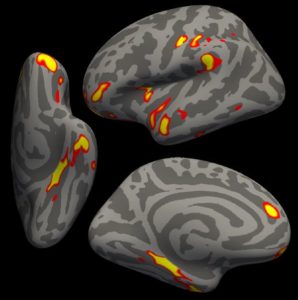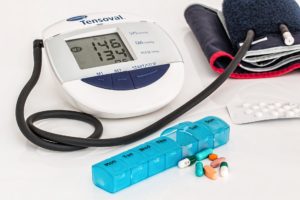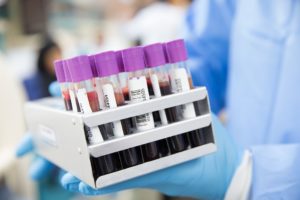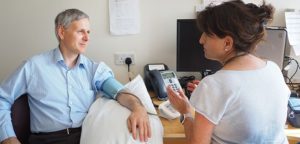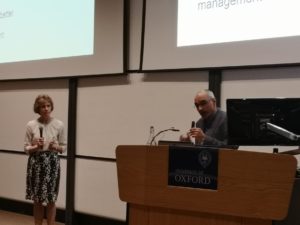A study of more than eight million people has found no increased risk of rare neurological events after COVID -19 vaccination. However, the researchers did find a higher risk of Bell’s palsy (facial weakness), encephalomyelitis (inflammation of the brain and spinal cord) and Guillain-Barré ... READ MORE
News for Preventive Neurology
First UK pilot study of newborn screening for spinal muscular atrophy launched
University of Oxford researchers have launched a pilot study to conduct routine testing of newborn babies for spinal muscular atrophy (SMA) for the first time. Every five days a baby is born in the UK with SMA. If treatments are delivered at birth, these newborns have the best chance of living ... READ MORE
Brain regions related to smell show decline after mild COVID-19
University of Oxford researchers have found tissue damage and greater shrinkage in brain areas related to smell in people following mild SARS-CoV-2 infection. The researchers, who were supported by the NIHR Oxford Biomedical Research Centre (BRC) used data from UK Biobank participants to look ... READ MORE
New Senior Research Fellows named
The NIHR Oxford BRC has announced the appointment of its latest group of Senior Research Fellows – the third cohort of emerging research leaders to receive the accolade. Like in 2020, this year’s selection process was a coordinated effort by the Oxford BRC and its partners in the NIHR ... READ MORE
Having a healthier heart associated with better problem-solving and reaction time
People with healthier heart structure and function appear to have better cognitive abilities, including increased capacity to solve logic problems and faster reaction times, according to a study involving University of Oxford and Queen Mary University of London (QMUL) researchers. The study, ... READ MORE
Oxford BRC researchers named among new Academy of Medical Sciences fellows
A number of leading researchers supported by the NIHR Oxford Biomedical Research Centre are among 50 prominent biomedical and health scientists elected to the Academy of Medical Sciences’ respected and influential Fellowship. The new Fellows include Oxford BRC experts who have spearheaded the ... READ MORE
More people could benefit from blood pressure-lowering medication, study finds
Blood pressure-lowering medication can prevent serious cardiovascular conditions such as strokes, heart failure and heart attacks, even in adults with normal blood pressure, according to a new research by University of Oxford researchers In a paper published in the Lancet, the researchers found ... READ MORE
Eight BRC projects get RCF funding
Eight Oxford BRC proposals, many covering a number of themes, have been awarded NIHR Research Capability Funding (RCF) funding to take forward key areas of research. The selected projects that will be supported include: Developing a research centre devoted to urgent and acute careThe ... READ MORE
Study explores effects of COVID-19 on sleep
Oxford researchers have launched a study investigating the impact of the COVID-19 pandemic on sleep and daily rhythms in adults. The UK arm of the International COVID-19 Sleep Study (ICOSS) is led by Professor Colin Espie from the Nuffield Department of Clinical Neurosciences at the University ... READ MORE
Social disconnection worsens mental health after a loss
Keeping grief hidden can be a survival strategy after suffering a bereavement. However new research shows that the social disconnection caused by concealing feelings of loss can increase psychological distress. After bereavement people can feel afraid of opening up about their grief to others. ... READ MORE
Researchers identify a new blood-based test to help predict Parkinson’s disease
Research carried out in Oxford has led to the development of a new way to test for Parkinson’s disease before the main symptoms occur. This could allow clinicians to identify patients who would benefit from precision therapies that are currently at clinical trial stage. Parkinson’s disease is the ... READ MORE
Seven new Senior Fellows named
The Oxford BRC is delighted to announce the appointment of seven new Senior Research Fellows, the second cohort of emerging research leaders to receive the accolade. The selection process was a coordinated effort by the Oxford BRC and its partners in the NIHR Oxford Health BRC, which focuses on ... READ MORE
New stroke research centre opens in Oxford
Research into strokes and vascular dementia took a major step forward on Thursday (5th March) with the official opening of the Wolfson Centre for the Prevention of Stroke and Dementia (CPSD) in Oxford, based at the new Wolfson Building at the John Radcliffe Hospital. The new centre is the only ... READ MORE
Oxford researchers test ‘Viagra’ drug to prevent recurrent strokes
University of Oxford researchers have begun a clinical trial to assess whether the drug sildenafil, more commonly known by its commercial name Viagra, could improve blood flow to the brain and so have the potential to reduce damage to small blood vessels in the brain and prevent ... READ MORE
Severe reactions to grief can be predicted and treated in the first months following a bereavement
Memory, coping strategies and resilience immediately following a loss have been shown to predict the path of a bereaved person’s grief according to new research. The study, published in the Journal of Consulting and Clinical Psychology, also suggested that clinical intervention in the ... READ MORE
International students learn about Oxford’s neuroscience and diabetes research
Around 50 international students interested in a career in medicine or science have visited Oxford BRC-funded research facilities. Half the students, who are taking part in the London International Youth Science Forum (LIYSF), visited the John Radcliffe Hospital’s Neuroscience department, while ... READ MORE
Smartphone test predicts how symptoms develop in Parkinson’s
Researchers in Oxford have found that a simple test carried out on a smartphone can help to accurately predict future change in people in the early stages of Parkinson’s, helping to determine the support they may need. This study, supported by the NIHR Oxford Biomedical Research Centre (BRC) ... READ MORE
Stroke deaths in England halved in ten years, study finds
Deaths from stroke in England halved in the first 10 years of the 21st Century, thanks to improved treatment, a study by Oxford BRC-funded researchers has found. However, the study, published in the BMJ, warned that there had been an increase in the number of people under the age of 55 who had ... READ MORE
NIHR Oxford BRC Senior Research Fellows named
The Oxford BRC is delighted to announce the appointment of seven new Senior Research Fellows. They were chosen from an extremely strong field of 47 applicants from across the scientific and clinical community because they demonstrated that their research was high impact and of high quality . ... READ MORE
Event showcases BRC work tackling chronic diseases
Around 170 people attended a BRC event on Tuesday (26 March) that provided an opportunity to network and to hear about the breadth of research taking place in Oxford to combat chronic diseases such as diabetes, obesity, cardiovascular disease and dementia. The Chronic Disease Cluster, ... READ MORE


